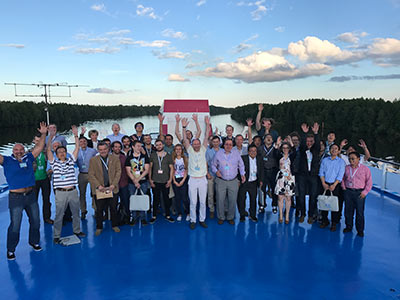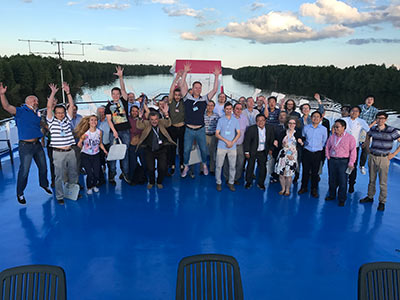Magnetic Fields in Laboratory High Energy Density Plasmas (LaB)
Presentations
The “LaB” workshop series aims at bringing together, in a transdisciplinary forum, scientists interested in the emerging areas of coupling laboratory high-energy-density (HED) plasmas and external and internal intense magnetic fields in varied domains, including plasma astrophysics, inertial fusion, and particle acceleration. Magnetic fields have been widely recognized to have profound effects in these areas, but specific progress is hindered by limited theoretical understanding and diagnostics capabilities. The main aim of such a forum is to serve as an exchange of ideas, discussion of theoretical and experimental work that has been done, and to explore potential new collaborations in these critical areas.
Chair
Julien Fuchs, CNRS, Ecole Polytechnique, France
Coordinators
Andrea Ciardi, Sorbonne University-UMPC, Observatoire de Paris, France
Dustin Froula, Laboratory for Laser Energetics, University of Rochester, USA
Emmanuel d’Humières, Univ. Bordeaux, CNRS, CEA, CELIA, France
Hantao Ji, Princeton University, USA
Mattias Marklund, Chalmers University of Technology, Sweden
Sergey Pikuz, JIHT, RAS, Russia
Carlo Rizzo, U. Toulouse, LNCMI-CNRS, France
Scientific Secretary
Mikhail Starodubtsev
Institute of Applied Physics RAS
46 Ulyanov Str., 603950 Nizhny Novgorod, Russia
Tel: +7 (831) 4321441, Fax: +7 (831) 4363792
e-mail: mstar@appl.sci-nnov.ru


Invited Speakers
 |
Alexander Andreev
St. Petersburg State University, Russia
Generation and detection of super-strong magnetic fields by ultra-intense laser pulses |

|
Dmitry Bisikalo
Institute of Astronomy of the Russian Academy of Sciences, RussiaModelling of accretion processes in magnetized binary stars
|

|
Gennady S. Bisnovatyi-Kogan
Space Research Institute Russian Academy of Sciences, Russia
Mechanisms of astrophysical jets formation and comparison with laboratory experiments
|

|
Simon Bolanos
Ecole Polytechniqie, LULI, France
Reconnection experiments with a guide field |

|
Andrey Brantov
P.N. Lebedev Physical Institute of the Russian Academy of Sciences, Russia
Relativistic laser-plasma interaction: high-energy particles, gamma and THz radiation, magnetic fields |

|
Laura Chen
University of Oxford, UK
Magnetic field amplification and particle acceleration in laboratory astrophysics |

|
Julien Fuchs
Ecole Polytechniqie, LULI, France
Ion interactions with dense plasmas in magnetized and unmagnetized configurations |

|
Yuji Fukuda
National Institutes for Quantum and Radiological Science and Technology, Japan
Laser-driven ion accelerations with sub-micronsize cluster targets: Contributions of shocks and magnetic vortexes |

|
Vladimir Gubchenko
Institute of Applied Physics of the Russian Academy of Sciences, Russia
Kinetic approach to magnetic reconnection: from space to HED laser plasma |

|
Guangyue Hu
University of Science and Technology of China (USTC)
Laser plasma evolution in external 10T intense magnetic field |
 |
Andrey Ivanovsky
RFNC-VNIIEF (Russia)
Study of physical processes at high energy
densities with the use of explosive magnetic generators |
 |
Philipp Korneev
NRNU MEPhI (Russia)
Laser-plasma magnetization for laboratory
astrophysics |

|
Yasuaki Kishimoto
Kyoto University, Japan
Confinement of high energy density plasma produced by the interaction between high intensity laser and structured medium |
 |
Deepak Kumar
ELI Beamlines, Czech Republic
Generation of sub-MG quasi-stationary
magnetic field using cm scale capacitor-coil targets |
 |
Florian Kroll
Helmholtz-Zentrum Dresden-Rossendorf, Germany
Experimental study of accretion processes in binary stars by combining laser-generated plasma flows with an external magnetic field |

|
Kirill Lezhnin
Princeton University, USA
Dynamics of relativistic electron vortices in collisionless plasmas |

|
Chikang K. Li
Massachusetts Institute of Technology, USA
Measurement of self-generated spontaneous fields and their effects on ICF ion kinetic dynamics |
 |
Anatoly Maksimchuk
University of Michigan, USA
Relativistic Magnetic Reconnection Driven by High Intensity Lasers |
|
Quentin Moreno
Centre Lasers Intenses et Applications, France
PIC simulations for the study of collisionless shocks formation in laboratory astrophysics context |

|
Motoaki Nakatsutsumi
European XFEL GmbH, Germany
Magnetic inhibition of proton acceleration by intense lasers |

|
Sergey Pikuz
Joint Institute for High Temperatures, Russian Academy of Sciences
X-ray spectroscopy diagnostics on magnetized plasma flows with astrophysical relevance |

|
Bin Qiao
Peking University, China
Relativistic reconnection in extreme magnetic astronomical environment |

|
Martin Read
York Plasma Institute, University of York
Beam self-focusing and electron transport effects in magnetised laser-plasmas
|

|
Guilhem Revet
Ecole Polytechniqie, LULI, France
Magnetized accretion dynamics in the laboratory |

|
Shohei Sakata
Institute of Laser Engineering, Osaka University, Japan
First experimental demonstration of isochoric heating of a dense plasma core with assistance of external kilo-tesla magnetic field |

|
Kevin Schoeffler
Instituto Superior Tecnico, Lisbon, Portugal
Biermann vs/& Weibel: General kinetic solution for the generation of magnetic fields via density and temperature gradients |

|
Ildar Shaikhislamov
Institute of Laser Physics, SB RAS, Russia
Collisionless super-Alfvenic interaction and generation of large amplitude pre-shock magnetosonic wave in laser plasma experiment |

|
Mikhail Starodubtsev
Institute of Applied Physics, Russian Academy of Sciences, Russia
Plasma penetration across a magnetic field |

|
Akifumi Yogo
Institute of Laser Engineering
Osaka University, Japan
Ion acceleration from the modulated electric and magnetic fields by bundled picosecond laser beams |

|
Zhe Zhang
Institute of Physics, Chinese Academy of Sciences, China
Generation and application of a laser driven magnetic field in Lab-Astrophysics researches |

|
Jiayong Zhong
Beijing Normal University, China
Magnetic reconnection experiments with Shenguang II upgrade lasers |
Cremlin workshop
Key technological issues in construction and exploitation of 100 PW class lasers
The project CREMLIN (Connecting Russian and European Measures for Large-scale Research Infrastructures) is intended to foster scientific cooperation between the Russian Federation and the European Union in the development and scientific exploitation of large-scale research infrastructures. The laser complex XCELS developed at IAP RAS provides a wonderful opportunity for establishing and enhancing scientific cooperation and strong networks between this Russian megascience facility and the European research infrastructures. Identification of key technological issues relevant to 100 PW class laser systems is the principal goal of the workshop.
Chairs
Alexander Sergeev, Institute of Applied Physics RAS, Russia
Catalin Miron, ELI, Romania
Scope
- Physics of petawatt and multi-petawatt lasers
- Pump laser for final cascades of (parametrical) chirped pulse amplifiers
- Characterization of high power laser beams and pulses
Increase of repetition rate of high power lasers
Cremlin project manager at IAP
Nadezhda Krivatkina
Institute of Applied Physics RAS, Russia
Tel: +7 (831) 4164684, Fax: +7 (831) 4363792
e-mail: krivat@appl.sci-nnov.ru


































